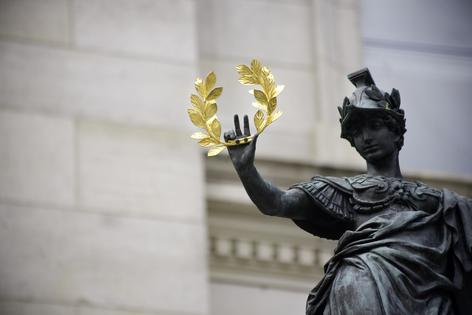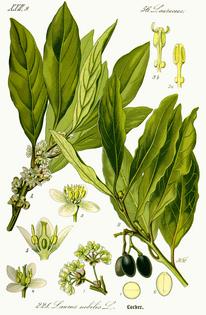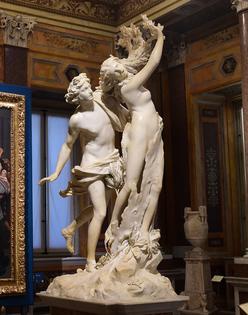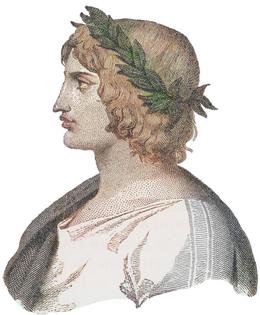What's a laureate? A classicist explains the word's roots in Ancient Greek victors winning crowns of laurel leaves
Published in Political News
When the Nobel Prizes are handed out each year, honorees each receive a medal and monetary prize. Even in the absence of these material goods, the honor of being a Nobel laureate persists as part of someone’s name or title, like a heroic epithet to recognize a life’s achievement.
I annually join my colleagues in the arts and sciences praising the winners and everything they have accomplished. As a scholar of classical studies, I also mull over the journey of that strange word, laureate, and how aptly it names those who receive it.
The English word “laureate” dates back to the 15th and 16th centuries, when it jumped almost straight out of the Latin “laureatus,” an adjective to describe someone crowned with a wreath of laurel leaves. But laurel’s history as a symbolically important plant goes back thousands of years.
The laurel plant is one of a number of small bushes and trees found originally in the Mediterranean. Some varieties grow dozens of feet tall, often marked by smooth, sometimes wavy leaves, with berries and flowers of different colors. Many people will recognize the long, green aromatic leaves as bay, a popular spice in a range of cuisines.
The laurel was a useful plant, part of a long tradition of using the gifts of the natural world to treat human ailments.
The Romans had a variety of medicinal uses for the plant. They applied its leaves to snake bites and ingested them as an emetic. They prepared the plant with its berries in various cold remedies.
The Greeks used Laurus nobilis, or “bay laurel,” as a remedy for rashes from other plants and boiled it down for antiseptic and first aid applications.
But the use of crowns crafted from laurel sprigs emerged for different reasons.
While “laurus” is the Romans’ word for the cultivated plant, the idea of being crowned or wreathed with laurel likely came first from the Greeks. They associated this plant, which they called “daphne,” with ritual purification and divine inspiration.
Worshippers of the god Apollo held the laurel tree to be sacred, as the location of the god’s oracular statements. In some traditions, the Pythia – the priestess who pronounced oracles at Delphi, one of the most sacred sites in the early Greek world – would chew laurel leaves, potentially to hallucinogenic effect, before delivering a prophecy.
The origin story of Apollo’s love for the laurel tree is more menacing. In the Roman poet Ovid’s “Metamorphoses,” Eros – Cupid to the Romans – sought to punish Apollo for mocking him, so he made him become infatuated with a young female nymph, Daphne.
She fled his repeated – and violent – advances, and begged her father, a river god, for help. He transformed his daughter into the laurel tree. Daphne avoided Apollo in her human form, but she could not escape becoming his sacred property.
While this story explains the laurel as Apollo’s sacred plant, its medicinal or imagined mind-altering effects may be better explanations for the tree’s association with Apollo, a god of medicine, prophecy and poetic arts.
The Greeks held the Pythian Games at Delphi every two years after the Olympic Games. By the time they were established in the sixth century B.C. in honor of Apollo, laurel was connected to the god strongly enough to be offered as the prize for victors.
These games, unlike the Olympics, started out with competitions in singing, poetry and dance, and later evolved to include athletic competitions. Laurel’s function as a prize in honor of Apollo and a marker of poetic power is the reason the laureate crown was adopted to honor poets and men of letters in the early Renaissance.
The story of “laureatus” has a few further twists. Ancient Greeks would suspend violent conflicts to hold their annual competitions. This tradition may be the reason the Romans used the Laurus delphica – the laurel tree native to the sacred site of Delphi – as a symbol of peace. They adorned announcements of victory called litterae laureatae (“laureate letters”) with wreaths of laurel.
In higher education, the word “baccalaureate” preserves the meaning of laureate as someone who is honored or who has achieved something. The term is synonymous with a bachelor’s degree, and hails from a medieval Latin word.
The custom of applying the word “laureate” to a Nobel Prize winner, however, may be younger than the prize itself. The Oxford English Dictionary documents the first description of a Nobel honoree in this way happened in 1947.
Despite the phrase’s relative youth, the word’s history lends a deeper meaning to the title. As an ancient symbol of medicine, the arts and the end of war, the laurel certainly fits Nobel’s honoring of achievement in medicine, physics, chemistry, literature, economics and that most fragile of hopes, peace.
This article is republished from The Conversation, an independent nonprofit news site dedicated to sharing ideas from academic experts. It was written by: Joel Christensen, Brandeis University. If you found it interesting, you could subscribe to our weekly newsletter.
Read more:
From whistling arrows and trumpeting elephants to battle cries and eerie horns, ancient soldiers used sound to frighten and confuse their enemies
In ‘Rumors,’ Lizzo and Cardi B pull from the ancient Greeks, putting a new twist on an old tradition
Joel Christensen does not work for, consult, own shares in or receive funding from any company or organization that would benefit from this article, and has disclosed no relevant affiliations beyond their academic appointment.















Comments